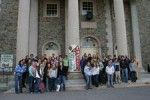Tangled Up in Green

The beginning of November saw an energetic burst of student activism geared toward shifting perspectives on environmental change on the Colgate campus.
On Friday and Saturday, Step It Up! organized a rally on the Academic Quad with four speakers, including senior Matthew Wisnieff of the Senior Class Gift Committee, who remarked on his belief that this century will be remembered as the “century of the environment.”
Seniors Rachel Surprenant and Stephanie Tubman coordinated the event, which attracted a crowd of about 60 students, faculty members and families from Hamilton and other neighboring towns. Though Tubman had hoped the rally would generate greater support, she is positive about the outcome overall.
“While we had big dreams, it is a great step for Colgate to be a part of a national movement,” she said. “If I do get down that more people weren’t involved, I just remember that change is slow, and, by necessity, difficult.”
As Colgate students were making their voices heard on campus, an additional 25 were at the University of Maryland attending Power Shift 2007, the first national youth conference on climate change. There, 6,000 students from across the country attended workshops and panels to learn about solutions to global warming, and later held meetings at almost every office in the House and Senate to discuss the 1Sky Platform. This three-part plan aims to create 5 million green jobs by 2015, cut carbon pollution by 80 percent by 2050 and establish a moratorium on all new coal-fired power plants.
Sophomore Katelyn Ciolino organized the registration, transportation and funding for the trip on behalf of Focus the Nation. She was able to obtain about $5,700 in funds from Professor of Philosophy and Religion and President of the University Rebecca Chopp’s Office, the Office of Residential Life and the Offices of Dean of First-Year Students Beverly Low and Vice President and Dean of the College Charlotte Johnson among others.
The conference commenced on Saturday with an itinerary that allowed attendees to sit in on any three of the 67 panel discussions being held on the University of Maryland campus. Ciolino attended one that invited attendees to discuss global warming and progressive politics with panelist Ralph Nader.
“He talked about how, as students, we have power, but we need to harness it,” she said. “We need to be educated to know that we are skilled and powerful citizens.”
Sunday continued with a similar format, giving conference members the chance to attend any three workshops, which covered a diverse array of topics both indirectly and directly related to climate change.
Other discussions touched on socially responsible consumerism, building effective and inclusive coalitions and campus and community organizing. They were led by project directors, founders, coalition coordinators, presidents, chairmen and students representing a wide array of organizations promoting environmental change.
In the evening, attendees gathered for training sessions and preparation for Monday, which opened with a march and rally on the West Lawn of the U.S. Capitol.
“It’s so hard to convey the energy, the sense that something was changing, the potential that was being built,” explained Ciolino. “This is a huge movement, and it’s growing. It’s not just about climate change, it’s about the way we live.”
Many of the students who had meetings in the House and Senate on Monday met with assistants and staff members speaking on behalf of the legislators. Sophomore John Kapnick, however, was able to have a videoconference with Illinois Senator Barack Obama. The two discussed the 1Sky Platform, and Kapnick lobbied for the various pieces of climate legislation on the table now in the U.S. Capitol.
Ciolino noted that the general response to the attendees’ proposals was that change is going to happen, but it will be slow at first.
“We all took notes, and gathered a mass quantity of information,” Ciolino said. “The great social movements of the past achieved success through coalitions. We’d like to work together with the other environmental groups on campus to see what we can do.”
Over the next few weeks, the students who attended Power Shift 2007 will be giving presentations for President Chopp and the Office of Residential Life to promote educational efforts to equip our society to restabilize the Earth’s climate.
“President Chopp and Residential Life especially expressed an interest in hearing what we learned in order to help make changes on campus,” Ciolino said. “There’s so much to be done, and because there are so many of us, it’s possible.”



